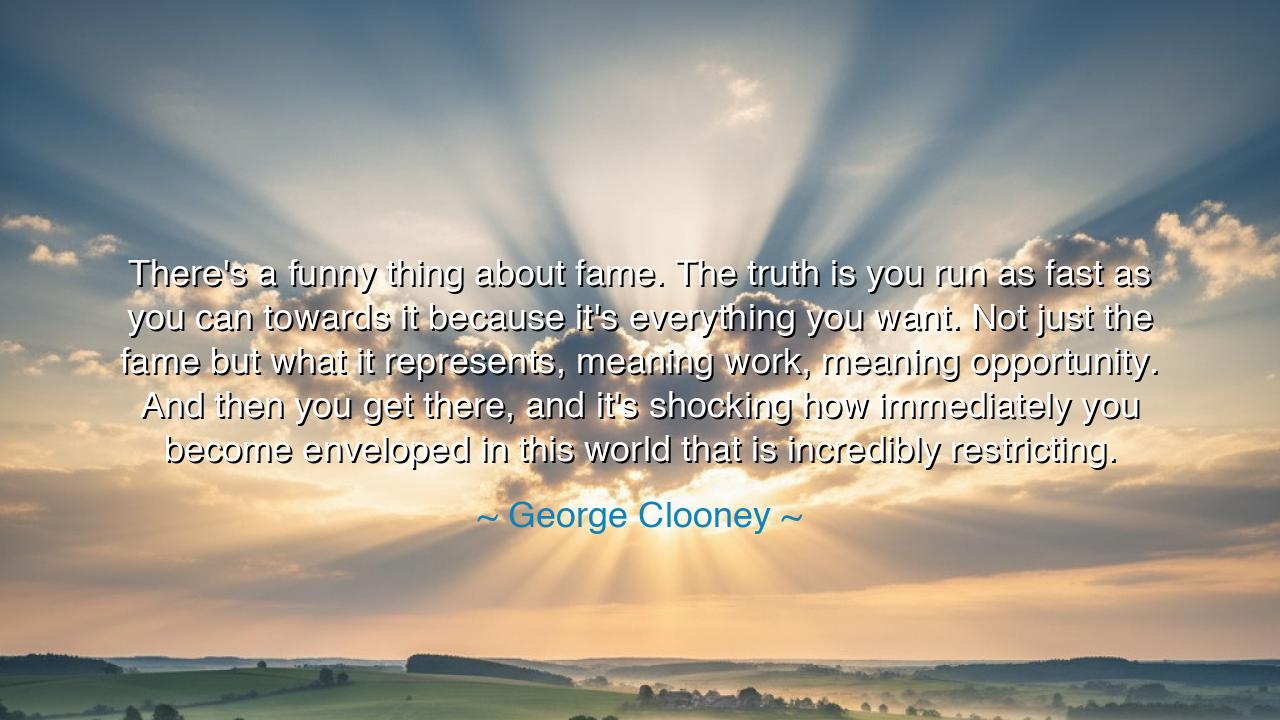
There's a funny thing about fame. The truth is you run as fast as
There's a funny thing about fame. The truth is you run as fast as you can towards it because it's everything you want. Not just the fame but what it represents, meaning work, meaning opportunity. And then you get there, and it's shocking how immediately you become enveloped in this world that is incredibly restricting.






The actor and philosopher of modern renown, George Clooney, once said: “There’s a funny thing about fame. The truth is you run as fast as you can towards it because it’s everything you want. Not just the fame but what it represents, meaning work, meaning opportunity. And then you get there, and it’s shocking how immediately you become enveloped in this world that is incredibly restricting.” In this reflection, Clooney speaks not only of the cost of celebrity, but of the eternal paradox of ambition — the human tendency to chase light, only to find that it can also blind. His words reveal the ancient truth that desire, even for noble things like purpose and recognition, carries within it a hidden trap: that once attained, it may confine the very freedom it promised to give.
When Clooney says that one “runs as fast as you can toward fame,” he captures the hunger that drives the soul of every creator, every dreamer, every human who yearns for meaning. Fame, to the seeker, is not vanity alone; it is validation — a sign that one’s work has touched the world. It is the doorway to opportunity, the currency of creation. To be known is to be seen, and to be seen is to exist. Yet, as Clooney reminds us, once that door opens, the light that pours through can become a cage. The world that once ignored you now watches your every move. The voice that was once free becomes burdened by echo. Thus, what was once liberation transforms into limitation.
This paradox is not new. The ancients spoke of it through myth and metaphor. The tale of Icarus is perhaps the most enduring — the boy who, with wings of wax, flew too close to the sun. In his flight, he felt the ecstasy of freedom, of rising higher than mortal limits, but he failed to see that the very light that inspired him was also his undoing. Clooney’s reflection mirrors this mythic wisdom: that ambition, unchecked by humility and self-knowledge, can consume the one who pursues it. The fire of achievement, while divine in spark, must be tempered by the discipline of self-awareness — or else it burns the soul that carries it.
Fame, as Clooney describes it, offers work and opportunity, but it also demands sacrifice — of privacy, of simplicity, of the quiet spaces where one can simply be. In the ancient courts of kings and emperors, the same truth held. The powerful lived surrounded by gold and music, yet envied the farmer who could walk freely in his fields. The philosopher Seneca, counselor to the Emperor Nero, wrote that wealth and power are illusions of freedom; they bind a man more tightly than chains of iron, because they enslave his heart. Clooney, in our modern world, speaks with that same Stoic clarity. The artist who achieves fame may gain the world’s gaze, but he risks losing his own reflection.
Yet there is tenderness in Clooney’s admission — not bitterness. He does not condemn fame, but rather exposes its dual nature. For to strive is human; to desire greatness is natural. What matters, he suggests, is not the pursuit, but the awareness that must follow. The wise learn to love the art more than its applause, the journey more than its arrival. True freedom lies not in being known by the world, but in knowing oneself amid the noise. Fame, then, becomes not a prison, but a test — a mirror that reveals whether one’s identity is rooted in truth or in perception.
There is a lesson in the life of Marcus Aurelius, the philosopher-king. He ruled the vast Roman Empire, commanding armies and shaping destinies. Yet in his Meditations, he wrote of the loneliness of power and the futility of praise. “Fame,” he said, “is but the clatter of tongues — a noise that soon dies in the air.” Still, Marcus did not abandon his duty; he chose instead to find meaning in virtue, not vanity. So too must every person who achieves recognition learn to hold it lightly — to remember that the applause of others cannot replace the peace of one’s own heart.
The lesson, then, is clear: pursue your dreams, but guard your soul. Run toward your goals, but remember that achievement is not the same as fulfillment. Let your work be driven by purpose, not applause; by creation, not recognition. If fame comes, greet it with humility, as one greets a guest who will not stay long. Do not mistake its glow for the sun. Instead, cultivate the quiet joy of craft — the deep satisfaction of doing something well for its own sake. For the one who finds meaning in the work itself can never be imprisoned by the world’s opinion.
So, my child, remember George Clooney’s words as both warning and wisdom. The world will tempt you to chase its shining rewards, to measure worth in attention and acclaim. But greatness is not in being known — it is in being true. If you rise, rise with grace. If you are seen, remain grounded. And when the world surrounds you with its glittering cage, laugh gently, as Clooney does, and remember that freedom is not found in the crowd’s applause, but in the stillness of your own soul.






AAdministratorAdministrator
Welcome, honored guests. Please leave a comment, we will respond soon